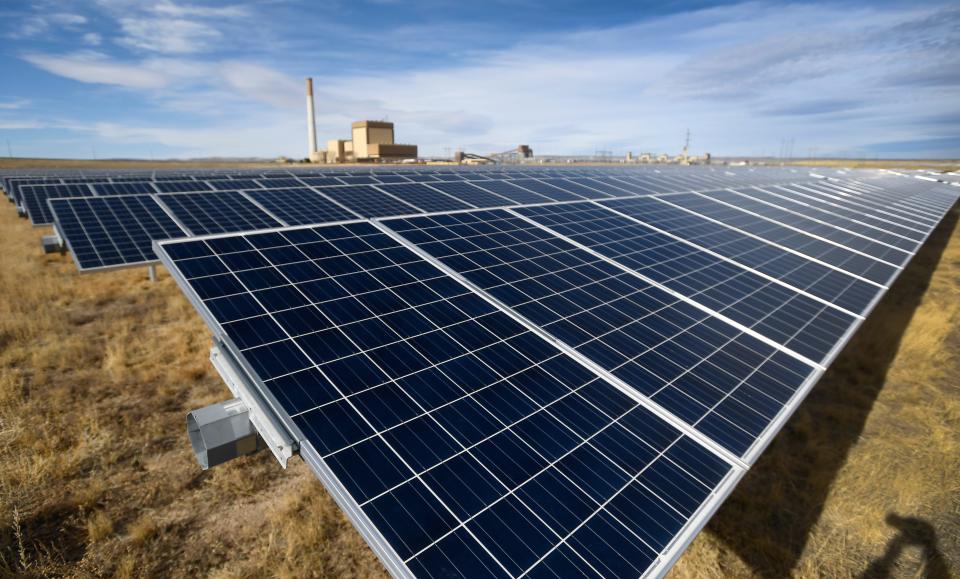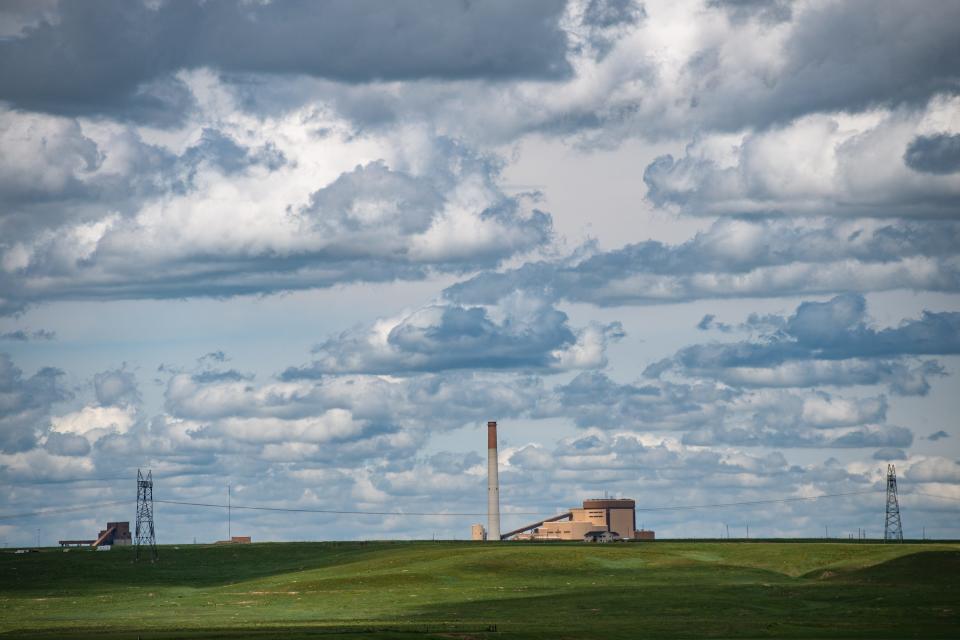Fort Collins' power provider pitches plan to help it be carbon-free. Some are uneasy about it
Even as it reaffirms its goal to be 100% carbon-free by 2030, Fort Collins' power provider has identified a plan to keep service reliable while battery storage technology ramps up.
One piece of that pie is building turbines that will initially burn natural gas but later can convert to clean fuel, Platte River Power Authority staff told their board of directors Tuesday.
Staff explained their plans and asked board members to consider a resolution of support. Some members of the board seemed to indicate support, but several said the resolution needs to more explicitly reaffirm PRPA's commitment to being carbon-free.
Some in the community are worried this plan is a step backward from the 2030 goal.
"It would be unconscionable to plan to operate a methane-fired power plant after 2030 for any reason other than to fill any gaps in demand for the PRPA’s owner communities that could not be met with non-carbon resources, including storage," Kevin Cross read from a written statement from the Fort Collins Sustainability Group.
"They should make the effort to investigate other options before they ask the board to essentially commit to develop that plan," he said in an interview with the Coloradoan.
But Raj Setti, PRPA chief transition and integration officer, told the board: "We are committed to make the grid green." He said their plan, known as "dispatchable capacity," is what makes renewable energy reliable.
The move will "help maintain system reliability while enabling deeper decarbonization as we wait for long-duration storage technology to mature and for distributed energy resources to be deployed in our owner communities," PRPA CEO and manager Jason Frisbie said in a letter published in the power provider's 2024 strategic budget.
About PRPA's 2030 goal to be carbon-free

PRPA is the wholesale supplier of electricity to Fort Collins, Loveland, Longmont and Estes Park. It's owned by the four cities, who each have two representatives on the board: their mayor and a staff member.
PRPA set a no-carbon goal in 2018. Today, carbon-free sources make up 33% of PRPA's portfolio. In 2024, it's expected to be 35.8%.
One way it's going to achieve cutting carbon emissions is through the closure of its coal-fired Rawhide 1 unit by the end of 2029. Today, coal supplies about 47% of PRPA's energy portfolio.
When that closure happens, PRPA told the board, it will need to have dispatchable capacity that can work with renewable energy sources and fill gaps quickly when wind and solar aren't producing.
This is known as "dark calm," when the sun is hidden and the wind is not blowing, sometimes for days at at time.
This actually happened in February 2021, when extreme cold settled over Northern Colorado, creating a regional shortage of natural gas as wind turbines stopped and snow covered solar panels.
What is the technology PRPA is proposing?
By 2030, wind, solar and hydroelectric will make up 88% of PRPA's energy portfolio, Setti said.
To cover the remaining 12%, staff is proposing a plan for dispatchable capacity. The plan has three components.
One is battery storage. This could be four-hour batteries or 100-hour batteries once the technology becomes viable for commercial uses.
The other is the virtual power plant, which aggregates power from different smaller energy sources, like solar from homes, to distribute it where and when it's needed.
The third piece will be building an aero-derivative combustion turbine, which is a gas- or hydrogen-fueled jet-type engine that starts up and stops fast, allowing it to be quickly accessed when solar and wind sources aren't producing enough.
The technology has been around for 100 years and is very reliable, flexible and low-emitting, said Masood Ahmad, PRPA resource planning manager.
The turbines initially will use natural gas. Once other options become available, like hydrogen, PRPA can make the switch. They also can use cleaner biodiesel and renewable natural gas.
Green hydrogen is likely to be viable for PRPA by 2045, staff said.
The project is expected to cost $240 million.
PRPA says it needs to begin moving now on acquiring the turbines so the technology is working two years prior to Rawhide 1's closure. The road ahead includes permitting, design, construction and must account for supply chain delays, staff said.
PRPA already has five older gas turbines at the Rawhide Energy Station. They were purchased in the early 2000s and have an expected life through 2040.
The existing turbines operate about 1% to 3% of the time, about 80 hours per year. The new turbines would operate anywhere from 5% to 20% of the time.
What PRPA isn't considering and why

Simply adding more solar and wind resources won't provide reliability, staff said. In simulations done by third-party consultant Black & Veatch, adding even 10,000 megawatts of solar and storage couldn't do it, Ahmad said, but 200 to 300 megawatts of new dispatchable capacity could.
Options like a small modular reactor, pump storage and carbon sequestration were all considered but are not suitable because of issues with access, costs and emissions.
Fort Collins Utilities Executive Director Kendall Minor said Tuesday that residents have asked if the current combustion turbines are sufficient. Plant Operations Manager Tyler Michie said they take a bit longer to fire up and aren't designed to be started and stopped the way the new turbines would be.
Minor also asked if converting the coal plant to burn methane was considered. Frisbie said for the same money, converting the plant wouldn't offer the same reliability or operational flexibility and would lead to more emissions.
Cross, with the Fort Collins Sustainability Group, said PRPA should continue to explore both of those options for the interim rather than building new natural gas infrastructure that will be in operation for decades.
While running a turbine on hydrogen is a good plan for the future, he said the cost of retrofitting the new gas turbines later to run on hydrogen will be an expensive undertaking, and PRPA's budget doesn't address the cost of paying for hydrogen generation or storage.
There are lots of new technologies coming up before then that can probably get PRPA over the dark calms, he said.
Other utilities are facing the same problems and planning the same solution, Setti said, including Xcel Energy.
Fort Collins Mayor Jeni Arndt said Tuesday she is concerned about the social justice impacts of a lack of reliability. In the Texas power crisis of 2021, for example, hundreds of people died, and the infirm and poor were more likely to be impacted.
Arndt said she's never heard anyone in PRPA waver in their commitment to reach 100% clean energy. "I hear full commitment to that."
Frisbie said situations like the one in Texas also have financial equity impacts. Utilities went bankrupt and people were getting bills that they couldn't pay.
Seth Miller of Northern Colorado Partners for Clean Energy told the board that fossil fuel investment runs counter to the community’s wish for 100% renewable energy.
He said he understands that conditions are evolving over time: "Please keep listening ... you can authorize preliminary actions, but we don't have to commit" while PRPA keeps the listening process going.
PRPA is in midst of its integrated resource plan, IRP, which has to be updated every five years, and Cross said its next update should be completed before asking the board to move forward on the natural gas turbines.
"I’m not saying this is easy and the solutions are super obvious. It’s a hard, technical problem," he said, but the bottom line is wait until the IRP is completed to commit to a technology.
Not many power providers have a target as aggressive as PRPA's. Others with a 2030 target for 100% carbon-free are Vermont Electric Cooperative in Vermont; Sacramento and Pasadena in California; and PSEG in New Jersey. Green Mountain Power in Vermont has a goal of attaining 100% renewable sources by 2030.
What's next?
The resolution will be formally considered at the board's October meeting, at 9 a.m. Oct. 26.
This article originally appeared on Fort Collins Coloradoan: Platte River Power Authority floats plan for natural gas turbines

